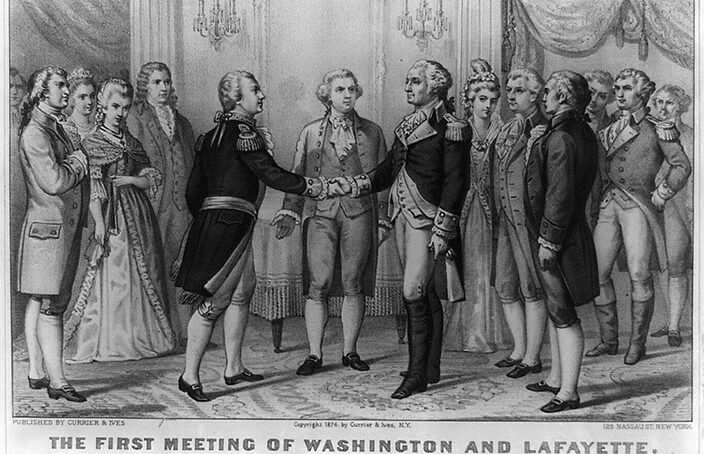Marquis de Lafayette’s Values About Independence Are Still Relevant – and Needed – Today
When asked if Marquis de Lafayette’s values are still relevant today, award-winning author and investigative journalist Bruce E. Mowday’s answer was a resounding Yes! “In fact, as I do programs on Lafayette across the country, many times people say we need Lafayette today,” he said. “All of his life Lafayette stood by his idea that all should have freedom and independence. He spent years in prison fighting for the rights of the French populace.”
Mowday has written several books on Lafayette and the American Revolution, including Lafayette at Brandywine: The Making of an American Hero. In the book, he discusses Lafayette and all his worthy accomplishments, especially Lafayette spilling his blood for America at the battle of Brandywine.
However, Bruce also said he felt that Lafayette would be “dismayed” with what America looks like today. “Our citizens trample on each other’s rights. While Lafayette and the other brave freedom fighters of his time put their lives on the line to gain independence, today we are populated by cowards doing everything they can to destroy the fabric of this nation,” he said.
Lafayette believed so deeply in the American ideals of liberty, equality and independence that he left his home in France as a teenager to fight in a war for a country that wasn’t his own. As a result, a defining factor of his legacy was receiving the moniker “The Hero of the Two Worlds” for his service to both France and what would become America.
Lafayette was a French aristocrat, Freemason and military officer who played an integral role in both the American Revolution and the French Revolution. By the time he turned 18 in 1775, Lafayette was already beginning to equate his values and beliefs with those of the American Revolution.
A conversation with Charles-François de Broglie (Marquis de Ruffec) about the ongoing revolt against British rule by Britain’s North American colonies started Lafayette on his path to history. When Lafayette heard in 1776 that French officers were being sent to America, he demanded to be among them. By August of 1777, he was dining with General George Washington, who was serving as commander in chief of the Continental Army.
Lafayette quickly became a part of Washington’s staff. Although Washington wouldn’t make Lafayette the commander of a military division because of his foreign birth, the Founding Father held Lafayette in high regard and acted as a surrogate father to him.
Lafayette made an instant mark on the American military with his work during the Battle of Brandywine on September 11, 1777. He joined General John Sullivan and the Third Pennsylvania Brigade and attempted to rally the unit to face an attack from the British, who were trying to take Philadelphia. Although he was shot in the leg during the battle, Lafayette rallied the troops and orchestrated a more orderly retreat. As a result, Washington cited him for “bravery and military ardour” and wrote to Congress asking that Lafayette be given command of a division.
Following the Battle of Brandywine, Lafayette returned to France and successfully lobbied for their support in helping America fight the British. That support played a crucial role in Lafayette’s success in fighting against General Charles Cornwallis and the British in the Battle of Yorktown in 1781. After Lafayette positioned his artillery on Malvern Hill to surround and contain the British, the French fleet came through and won the Battle of the Virginia Capes and deprived Cornwallis of his naval protection. When Lafayette joined forces with Washington in September of 1781, it was the French fleet’s turn to provide the blockade against the British that the American troops needed to overtake Yorktown.
He was later on hand when the Treaty of Paris was signed between Great Britain and the United States, which signaled the end of the American Revolution. He returned to France once again and became a key figure in the French Revolution in 1789 as the leader of the Garde Nationale and also the July Revolution of 1830.
Lafayette was a proponent of the Age of Enlightenment movement, which focused on a number of ideals related to the value of human happiness. He was especially passionate about those involving human rights and civic nationalism, and was also vehemently opposed to slavery. His dream was that America would grow to become a republic that valued virtue, honesty, tolerance and justice.
Lafayette said, “When the government violates the people’s rights, insurrection is, for the people… the most sacred of the rights and the most indispensible of duties.”
He was the initial author of the Declaration of the Rights of Man and of the Citizen, a human civil rights document written during the time of the French Revolution and adopted by France’s National Constituent Assembly in 1789. The 17 articles include:
Article IV – Liberty consists of doing anything which does not harm others: thus, the exercise of the natural rights of each man has only those borders which assure other members of the society the fruition of these same rights. These borders can be determined only by the law.
And Article XI – The free communication of thoughts and of opinions is one of the most precious rights of man: any citizen thus may speak, write, print freely, except to respond to the abuse of this liberty, in the cases determined by the law.
At American INSIGHT, it’s our hope that by sharing articles and information about forgotten historical luminaries like Benjamin Chew, his long-time friend, Gilbert du Motier, Marquis de Lafayette, and through highlighting the work of modern authors like Bruce E. Mowday, Kermit Roosevelt, and scriptwriter Marshall Ferrin, we are educating and empowering younger generations to discover the values and ideals of free speech, human rights and the rule of law.
—
Featured image courtesy of Wikimedia Commons.

